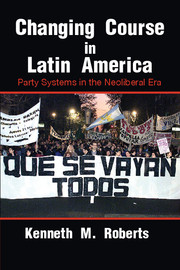Book contents
- Frontmatter
- Dedication
- Epigraph
- Contents
- List of Figures
- List of Tables
- Preface and Acknowledgments
- List of Abbreviations
- 1 Introduction: Party System Change in the Neoliberal Era
- Part I Explaining Regional Patterns
- Part II National Experiencesin Comparative Perspective
- Appendix Election Results in Latin America
- References
- Index
Preface and Acknowledgments
Published online by Cambridge University Press: 18 December 2014
- Frontmatter
- Dedication
- Epigraph
- Contents
- List of Figures
- List of Tables
- Preface and Acknowledgments
- List of Abbreviations
- 1 Introduction: Party System Change in the Neoliberal Era
- Part I Explaining Regional Patterns
- Part II National Experiencesin Comparative Perspective
- Appendix Election Results in Latin America
- References
- Index
Summary
Preface and Acknowledgments
This book began as a relatively straightforward attempt to understand why some party systems are more stable than others in Latin America, but it quickly evolved into a larger and more ambitious effort to identify the impact of economic crises and market reforms on democratic representation. Ultimately, it sought to explain how and why a transition from one economic era to another was also a major turning point in Latin America’s political development. I began, perhaps naively, to conceive of that economic transition as a critical juncture in political development long before I was able to identify the full range of its institutional effects, much less its longer-term political legacies. To put it in Gramsci’s more eloquent terms from the epigraph, I began this project in a moment of crisis in Latin America, an interregnum “when the old was dying and the new could not be born,” and a great variety of “morbid” (and often fleeting) symptoms appeared. Enough time has now passed for me to hazard a claim that new political orders were born during this watershed period, even if some of them veered off in unexpected directions or remain institutionally fluid (as the reader will quickly discover). The purpose of this book is to trace where these new orders came from, explain why some are more stable than others, and identify what makes them different, both from each other and from the political orders that preceded them.
Any research project this long in the making is bound to incur debts to individuals and institutions that are too numerous to mention. That is surely the case with this book. Although I cannot acknowledge everyone who deserves to be thanked, I want to at least recognize a number of individuals who made especially vital contributions. From the outset of this project, Ruth Berins Collier and David Collier provided intellectual inspiration and constructive feedback. They have been remarkably generous in supporting my efforts to build upon the intellectual foundation they laid in their study of earlier critical junctures in Latin America. I also learned a great deal from intensive workshops centered on earlier drafts of my book that were organized by Erik Wibbels and Margaret Levi at the University of Washington, Jorge Lanzaro at the Universidad de la República in Uruguay, and Juan Pablo Luna at the Universidad Católica in Chile.
- Type
- Chapter
- Information
- Changing Course in Latin AmericaParty Systems in the Neoliberal Era, pp. xiii - xivPublisher: Cambridge University PressPrint publication year: 2015



